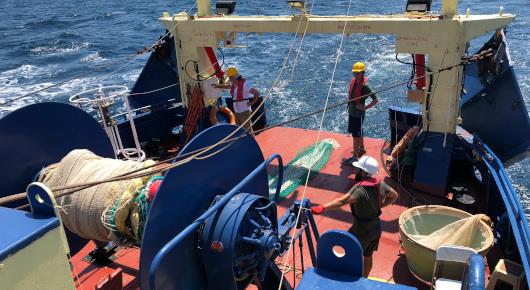Researchers conclude 21 days at sea surveying Black Sea fish

The Bosphorus, the narrow strait in Istanbul that connects the Black Sea basin to the rest of the world, hosted a special guest on 12 July. Affectionately named “Bilim” (Turkish for “Science”), the oceanographic research vessel (RV) from Middle East Technical University (METU) in Ankara, Turkey was just embarking on a 21-day survey of the Black Sea.
A group of Turkish scientists were joined on board by six international researchers for a mission to study Black Sea anchovy stocks and monitor the environmental conditions that influence them.
On this trip, its ninth outing in the Black Sea since 2011, RV Bilim-2 hosted the first exchange of technical knowledge among researchers from Bulgaria, Georgia, the Russian Federation, Ukraine and Turkey, all of which border the Black Sea. The mission, which was led and hosted by the Institute of Marine Sciences (IMS) at METU, was made possible by financial and administrative support from Turkey’s Ministry of Agriculture and Forestry.
The collaboration was undertaken within the context of the BlackSea4Fish project, established by FAO’s General Fisheries Commission for the Mediterranean (GFCM) together with the riparian states – the countries that border the Black Sea. Steered by all riparian states, the project has financial backing from the Directorate-General for Maritime Affairs and Fisheries of the European Commission.
Ali Cemal Gücü, coordinator of BlackSea4Fish and professor at METU’s Institute for Marine Sciences in Mersin, Turkey, led this pioneering mission.
“Surveys and research are extremely important to support stock assessment work and improve the quality of scientific advice,” Gücü explained. “Quality advice is essential to establish joint management plans and achieve sustainable fisheries.”
In its mid-term strategy for the sustainability of Mediterranean and Black Sea fisheries, the GFCM has set a number of targets. Among them is a call for better utilization of scientific advice in support of fisheries management, specifically through enhancing knowledge and expertise on fish stocks. Conducting regional surveys at sea is a significant part of the efforts to achieve this target, and projects like BlackSea4Fish are central to supporting the process.
“Initiatives like this one are vital to enhancing scientific exchange and data collection,” said Abdellah Srour, GFCM’s executive secretary. “This collaborative work during a survey-at-sea is a virtuous example of cooperation among countries.”
At sea, the group of international researchers on RV Bilim-2 studied various techniques for surveying small pelagic fish species, including the Black Sea’s emblematic anchovy. Although small pelagics are by definition found near the sea surface and in middle depths, peculiar aspects of the Black Sea may make monitoring challenging. The marine basin is characterized by a surface layer low in salinity and, below 200 meters, an anoxic, or oxygen-depleted, layer. Regional differences in water temperature, current formation and availability of nutrients lead to variations that force large numbers of fish to migrate over long distances, often in directions that are hard to predict.
The mission provided an excellent setting for the exchange of knowledge, allowing the researchers to study the various survey techniques used in different settings. Data processing began on board, and the scientists were able to review the first set of results together. An interesting finding was that recognizable levels of Atlantic bonito and bluefish juveniles, which were not encountered in July surveys of the Turkish exclusive economic zone in previous years, were present.
After concluding their daily seminars on a range of surveying and data-processing methods, the scientists made time to connect more informally, enjoying a slideshow of pictures taken by various team members during the day.
“It is not only research that is shared on these missions,” Gücü said. “You also share your meals, your personal thoughts, and the beautiful vistas of the Black Sea with each other when you are on board an RV. A bond that is usually hard to find in scientific settings emerges among the team members and helps to facilitate future research collaboration.”
The mission, which covered the Turkish exclusive economic zone, ended on 3 August in Trabzon, Turkey.
20 August 2018, Ankara, Turkey
